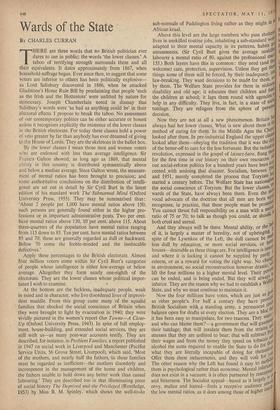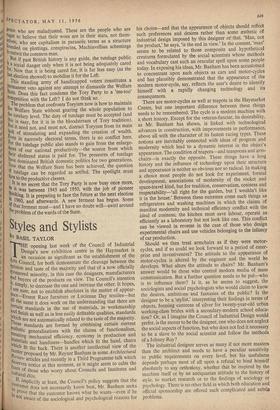Wards of the State
BY CHARLES CURRAN THERE are three words that no British politician ever dares to use in public; the 'words 'the lower classes.' A taboo of terrifying strength surrounds them and all their equivalents. It dates approximately from 1867, when household suffrage began. Ever since then, to suggest that some voters are inferior to others has been politically explosive— as Lord Salisbury discovered in 1886, when he attacked Gladstone's Home Rule Bill by proclaiming that people 'such as the Irish and the Hottentots' were unfitted by nature for democracy. Joseph Chamberlain noted in dismay that Salisbury's words were 'as bad as anything could be' in their electoral effects. I propose to break the taboo. No assessment of our contemporary politics can be either accurate or honest unless it recognises explicitly the existence of the lower classes in the British electorate. For today these classes hold a power of veto greater by far than anybody has ever dreamed of giving to the House of Lords. They are the skeletons in the ballot box. By the lower classes I mean those men and women voter's who are endowed with less than average intelligence. Sir Francis Galton showed, as long ago as 1869, that mental ability in this country is distributed symmetrically above and below a median average. Since Galton wrote, the measure- ment of mental ratios has been brought to precision; and some authoritative conclusions on the distribution of intelli- gence are set out in detail by Sir Cyril Burt in the latest edition of his standard work The Subnormal Mind (Oxford University Press, 1955). They may be summarised thus : `About 2 people per 1,000 have mental ratios above 150; such persons are generally found either in the higher pro- fessions or in important administrative posts. Two per cent. have mental ratios above 130, 10-per cent. above 115. About three-quarters of the population have mental ratios ranging from 115 down to 85. Ten per cent. have mental ratios between 85 and 70; these are generally regarded as dull or backward. Below 70 come the feeble-minded and the ineducable defectives.'
Apply these percentages to the British electorate. Almost four million voters come within Sir Cyril Burt's categories' of people whose intelligence is either low-average or below average. Altogether they form nearly one-eighth of the electorate. They are the lower classes whose political impor- tance I wish to examine.
At the bottom are the feckless,' inadequate people, weak in mind and in character, who live disordered lives of improvi- dent muddle. From this group came many of the squalid families that shocked the social conscience of Britain when they were brought to light by evacuation in 1940; they were vividly pictured in the women's report Our Towns—A Close- Up (Oxford University Press, 1943). In spite of full employ- ment, house-building, and extended social services, they are still with us—as man); post-war accounts testify. They are described, for instance, in Problem Families, a report published in 1947 on social work in Liverpool and Manchester (Pacifist Service Units, 56 Grove Street, Liverpool), which said, `Most of the mothers, and nearly half the fathers, -in these families must be regarded as inefficient—the mothers disorderly and incompetent in the management of the home and children, the fathers unable to hold down any better work than casual labouring.' They are described too in that illuminating piece of social history The Deprived and the Privileged (Routledge, 1953) by Miss B. M. Spinley, which shows the well-to-do SPECTATOR, MAY 11, 10 sub-normals of Paddington living rather as they might in I° African kraal. Above this level are the large numbers who pass sheltd lives in unskilled routine jobs, inhabiting a sub-standard wcrl adapted to their mental capacity in its patterns, habits °rI4A amusements. (Sir Cyril Burt gives the average unskiP, labourer a mental ratio of 80, against the professional O' 135.) Both layers have this in common ; they need (and the) welcome) care, protection, supervision. Unless they get the things some of them will be forced, by their inadequacy ilitC law-breaking. They want decisions to be made for them, no by them. The Welfare State provides for them in sickness' disability and old age; it educates their children and feeds the children at school; it laps them round with agencies to help in any difficulty. They live, in fact, in a state of s°civ,i tutelage. They are refugees from thb sphere of person4 decision. Now they are not at all a new phenomenon. Britain hat always had her lower classes. What is new about them is til method of caring for them. In the Middle Ages the Church looked after them. In pre-industrial England the upper class9 looked after them—obeying the tradition that it was the dull of of the better-off to care for the less founate. But the indusiti°j revolution, expressed in the gospel of laissez-faire, flung the for the first time in our history on their own resources. A1 our social-reform politics for a hundred years have been c° r1; cerned with undoing that disaster. Socialism, between 194' and 1951, merely completed the process that Toryisin bad started a century before. The Welfare State has nationalts the social conscience of Toryism. But the lower classes, wards of the State, have always been there. Even the 1°,11 vocal advocate of the doctrine that all men are born etltj' recognises, in practice, that these people must be protectejd You cannot thrust full responsibility .on a man with a 0114' is ratio of 75 or 70; to talk as though you could, or should' 1 both cruel and unreal. And they always will be there. Mental ability, or the 1t3c1' of it, is largely a matter of heredity, not of upbringin8adt spite of the Lysenkos of the Left, the dull cannot be r less dull by education, or more social services, or 101 houses—desirable as these things are. For intelligence is inn° „ d and where it is lacking it cannot be supplied by par"Y esteem, or as a reward for voting the right way. No c“3110,011 in environment, no social reconstruction however drastic, ref', lift the four millions to a higher mental level. Their P01 can be ended, and is being ended. But they will always s ' I, inferior. They are the reason why we had to establish a -f State, and why we must continue to maintain it. 001 Now the four millions have votes, which are just as as other people's. For half a century they have Pr°vi British Socialism with, a standing army, a permanent ci balance open for drafts at every election. They are a bloc II* it has been easy to manipulate, for two reasons. They Wa tit" and who can blame them?—a government that will pia° d their tutelage; that will insulate them from the strains a° stresses that they are unfitted to bear; that will subtract their wages and from the money they spend on tobacco 0 [1 alcohol the sums required to enable the State to do Lo- r i v11 e what they are literally incapable of doing for theirs-, Offer them these inducements, and they will vote for bYi1°V The other reason why the Left has found it easy tom oo them is psychological rather than economic. Mental inferept does not exist in a vacuum; it is often partnered by reser11n and bitterness. The Socialist appeal—based as it largelY; rote envy, malice and hatred—finds a receptive audience a. the low mental ratios, as it does among those of higher I- Bence who are maladjusted. These are the people who are eager to believe that their woes are in their stars, not them- !elves; who see capitalism in paranoic terms as a structure founded on plottings, conspiracies, Machiavellian schemings i° outwit the common man. But if past British history is any guide, the tutelage public ;8 a social danger only when it is not being adequately cared °t* Now that it is being cared for, it is far less easy (as the last election showed) to mobilise it for the Left. This standing army of handicapped voters constitutes a permanent veto against any attempt to dismantle the Welfare State. Does this fact condemn the Tory Party to a 'me-too' competition with the Left? I do not think so. • The problem that confronts Toryism now is how to maintain ;11,e Welfare State without gearing the whole population to „"F tutelary level. The duty of tutelage must be accepted (and this is easy, for it is in the bloodstream of Tory tradition). But it need not, and must not, distract Toryism from its main 181( of stimulating and expanding the creation of wealth. Even in narrowly electoral terms, there is no conflict here. :r the tutelage public also stands to gain from the enlarge- 'then. t of our national productivity—the source from which t. their sheltered status is paid for. The pressures of tutelage Now dominated British domestic politics for two generations. 'Notovy that the Welfare State has been achieved, the question turn tutelage can be regarded as settled. The spotlight must `1141 to the productive classes. It 18 no secret that the Tory Party is now busy once more, it was between 1945 and 1950, with the job of pioneer Viking. It is preparing to face the future at the next election of 1960, and afterwards. A new ferment has begun. Some that ferment must—and I have no doubt will—swirl around the problem of the wards of the State.



































 Previous page
Previous page